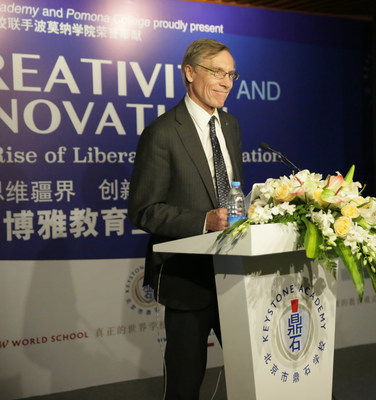BEIJING, November 17, 2014 /PRNewswire/ -- Steve Jobs, the founder of Apple; Jane Chen, founder of Embrace; and Matthew Estes, founder of Beijing-based Babycare Ltd. all have three characteristics in common -- creative thinking, a problem-solving streak, and an innovative mindset. These traits are not only a recipe for a successful career and promising future, but also a sign of a solid educational foundation. Ms. Chen and Mr. Estes, meanwhile, have one more thing in common -- a Liberal Arts education from Pomona College. "This is what a liberal arts education does so well and I would argue that developing these abilities is best done at a liberal arts college. And this is why liberal arts graduates are in demand by employers who are searching for men and women who can grow and lead their organizations," said Dr. David Oxtoby, President of Pomona College speaking at a lecture in Keystone Academy's Beijing campus.

Why Do Employers Prefer Liberal Arts Graduates?
A Liberal Arts education enables graduates to solve big problems, stressed Dr. Oxtoby, which are not narrow technical problems, but which involve many different fields of study. He added, "When I was studying Chemistry at Harvard, I was also studying History and Language and Literature. And I believe this is the best form of education, and that's why I advocate it." Technical skills are not enough in today's job market. If you have the right skills, you may get a job, but will you succeed at that job? Will you be able to address the increasingly complex nature of traditional and non-traditional jobs? Employers ask these very same questions and more. In a survey of over 300 employers by a Washington D.C. public opinion research establishment in April 2013, there was heavy consensus on the need for employees with qualities that only a liberal arts education could offer:
This creativity and innovation that are so sought after "are outcomes of a Liberal Arts education," reiterated Dr. Oxtoby. Employers increasingly recognize that the Liberal Arts education model is what fosters these traits because of its "smaller class sizes that emphasize collaborative learning, high level of student-teacher interaction, encouragement of intellectual curiosity through a broad and deep curriculum that engage in critical thinking across disciplines...and a strong focus on developing the ability to analyze and synthesize information."
Keystone Students Will Have an Edge
Keystone Academy's unique model that combines Chinese, American and international pedagogies has "many similarities to a Liberal Arts education," noted Dr. Oxtoby. Keystone draws on the Chinese tradition of a rigorous approach to learning; the inquiry-based and discussion-centered approach from the American tradition; and adds the development of critical thinking, creativity and global mindedness that are fundamental to the international approach. "I hope students will come out of Keystone with that broad interest. They will be interested in Mathematics and History and Art, all of those areas, and combine them and connect them when they go on to college," said Dr. Oxtoby also underscoring Keystone's choice of the International Baccalaureate Diploma Programme (IBDP) for high school, because it is a curriculum that has strong connections between subjects, and lays a robust foundation for students to thrive at Liberal Arts colleges such as Pomona.
It is not only what a student learns in class, it is about all the activities that students are involved in -- it is the whole approach to learning. Keystone Academy offers a whole range of activities. Dr. Oxtoby advised that it is important to encourage students to be daring, to take subjects and activities that they are not comfortable with. "If you know that you can really do well in Math, that is fine, but you should be encouraged to take a course where you are not sure you can do well because that is how you really learn the best -- that is what Keystone should do." And that was exactly the advice Head of School, Malcolm McKenzie offered in some closing remarks after Dr. Oxtoby's lecture, "I ask parents to encourage your children to do a wide range of activities and develop interests in many different things." With this holistic learning approach, Keystone students will definitely have an edge not just over undergraduate applicants to American and other international colleges and universities, but also be better prepared for success professionally and personally.
About Keystone Academy: Keystone Academy is a non-profit, philanthropic educational venture governed by a board of trustees. The school blends distinctive traditions in eastern, western, and international education, creating a "new world school" that is academically outstanding and a new model of education in China. At Keystone, we embrace a world that is dynamic and ever changing. We learn from and we learn for this enterprising, global community.